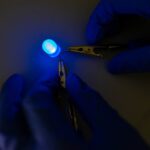From laboratory to prototype. Research in the field of energy storage supported by a prestigious European grant
Within a few years, a nanomaterial developed by Olomouc scientists, which turned out to be very suitable for devices storing electrical energy—supercapacitors, could be translated to practice. Researchers from the Czech Advanced Technology and Research Institute (CATRIN) of Palacký University Olomouc have tested nitrogen-doped graphene in laboratory conditions and now, thanks to a European grant, unique in the Czech Republic, they are starting the preparation of a prototype device in cooperation with colleagues from Bar-Ilan University in Israel and the Italian company ITELCOND. The project funded by the European Innovation Council (EIC) Transition Challenges with a budget of nearly 2.5 million Euros (about 62.5 million Czech koruna) was launched today in Olomouc.
Supercapacitors, which are used for storing electrical energy, offer a very interesting alternative to the currently most used lithium batteries. “We have recently developed an electrode material based on graphene, a two-dimensional material consisting of a single layer of carbon, which exhibits unique properties. Our goal is a supercapacitor that, compared to batteries, will be safer, more environmentally friendly, cheaper and, above all, will have high capacity and a longer lifetime. Since the development of the material and its synthesis on a laboratory scale, we have now been developing a prototype, which is already a last step before having the final product,” said the Principal Investigator Michal Otyepka from CATRIN. He and his colleagues have brought the material to this stage also thanks to another two prestigious projects funded by the European Research Council (ERC), which they can now build on. The first grams of the material were prepared by the researchers only four years ago, and now they are able to prepare it in kilogram quantities.
The properties of the material, which is already protected by a European patent, will be further optimised so that they can be used in the pilot production of a new type of supercapacitor. The aim is to increase the energy density of supercapacitors above 50 Wh/L, which is about twice as much as the best components on the current market. This will allow their widespread use in electric cars as well as a battery support in devices that need to be supplied with large amounts of energy in a very short time.
Researchers from Bar-Ilan University in Israel, a leader in energy storage materials with a strong emphasis on technology-oriented solutions with application potential, will also contribute their experience. “That is why we decided to join this outstanding project team and collaborate on the development of a prototype of unique active materials developed at the university in Olomouc. Our task is to focus on assembling pouch cells of energy storage devices using 2D materials,” said Malachi Noked, speaking for the Israeli partners.
University researchers in this project will be complemented by representatives of the Italian company ITELCOND. “As a company that has always stressed its role of a reference partner from the initial idea to the commercialization of the final project, we are thrilled to be involved in a project that combines basic research with industrialization, leading to marketing a new product. Our goal is to provide this project with all the knowledge we have gained in more than 45 years of our activity. At the same time, together with the outstanding team we work with, we intend to build a strong background that we can offer to future customers of this product,” said the company director Luca Primavesi.
Under the EIC Transition Challenges, 22 proposals were submitted from 17 countries. The financial support aims at new technologies that have already been experimentally validated in the laboratory, and it is necessary to prepare them for entering the market. CATRIN will coordinate this type of project not only as the only institution in the country, but also in the so-called Widening countries, which mainly include the new EU Member States acceding after 2004. The search for materials for efficient electricity storage is one of the major global challenges, which is gaining even greater momentum in the context of heavy fossil fuel consumption, increasing mobility and the growing number of electronic devices.
- Battery tester – a device for testing batteries.
- Functionality test of the supercapacitor – LED lights up.
- Veronika Šedajová inserts the material for the supercapacitor construction into the large transition chamber of the glovebox.





